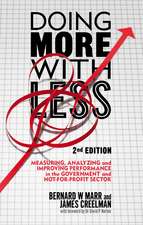How to Design a Program Evaluation: CSE Program Evaluation Kit, cartea 3
Autor Carol T. Fitz-Gibbon, Lynn Lyons Morrisen Limba Engleză Paperback – 18 feb 1988
Preț: 467.22 lei
Nou
Puncte Express: 701
Preț estimativ în valută:
89.41€ • 93.00$ • 73.82£
89.41€ • 93.00$ • 73.82£
Carte tipărită la comandă
Livrare economică 14-28 aprilie
Preluare comenzi: 021 569.72.76
Specificații
ISBN-13: 9780803931282
ISBN-10: 080393128X
Pagini: 168
Dimensiuni: 140 x 216 x 11 mm
Greutate: 0.25 kg
Ediția:1
Editura: SAGE Publications
Colecția Sage Publications, Inc
Seria CSE Program Evaluation Kit
Locul publicării:Thousand Oaks, United States
ISBN-10: 080393128X
Pagini: 168
Dimensiuni: 140 x 216 x 11 mm
Greutate: 0.25 kg
Ediția:1
Editura: SAGE Publications
Colecția Sage Publications, Inc
Seria CSE Program Evaluation Kit
Locul publicării:Thousand Oaks, United States
Cuprins
An Introduction to Evaluation Design
The Elements of Design
Designs - An Overview
Designs 1, 2 and 3
The Control Group Designs
Designs 4 and 5
The Time Series Designs
Design 6
The Before-and-After Design
A More Complex Design
Analysis of Variance (ANOVA)
How to Randomize
The Elements of Design
Designs - An Overview
Designs 1, 2 and 3
The Control Group Designs
Designs 4 and 5
The Time Series Designs
Design 6
The Before-and-After Design
A More Complex Design
Analysis of Variance (ANOVA)
How to Randomize
Notă biografică
Carol Fitz-Gibbon initiated the A-Level Information System in 1983 and was Director of the Curriculum, Evaluation and Management Centre from 1989-2003 and Professor of Education at Durham from 1996-2003. She has a continuing interest in cross-age tutoring and Reforms as Experiments in an active retirement.
Descriere
Education, business and human service settings are included in this revised edition of How to Design a Program Evaluation. Additional examples in these fields makes this volume more relevant to a wider audience in comparison with the first edition.
Through the use of diagrams, step-by-step directions, flow charts, and extensive examples, the book shows how a variety of design options can be conceived and implemented. Focusing on quantitative designs, it shows what to do when things go wrong and presents detailed methods for collecting, analyzing, and presenting data for each design.
Through the use of diagrams, step-by-step directions, flow charts, and extensive examples, the book shows how a variety of design options can be conceived and implemented. Focusing on quantitative designs, it shows what to do when things go wrong and presents detailed methods for collecting, analyzing, and presenting data for each design.





















